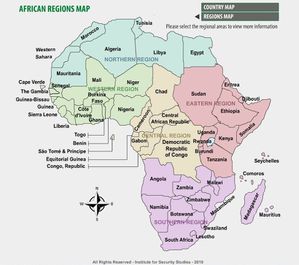June 19, 2012 defense-aerospace.com
(Source: U.S Department of Defense; issued June 18, 2012)
WASHINGTON --- The U.S. military is working with partner forces in Africa to build security on the continent, the Pentagon’s senior Africa expert said today.
In her keynote speech today, Amanda J. Dory, deputy assistant secretary of defense for African affairs, told attendees at the Africa Center for Strategic Studies’ senior leader seminar that U.S. defense efforts in sub-Saharan Africa closely follow the White House’s newly announced strategy for that region.
A White House fact sheet released June 14 lists four U.S. strategic objectives for sub-Saharan Africa: strengthen democratic institutions, spur economic growth, trade and investment, advance peace and security, and promote opportunity and development.
The U.S. military supports African nations’ efforts toward peace and security in many ways, particularly by countering terrorist groups, Dory said.
“We … concentrate our efforts on disrupting, dismantling and eventually defeating al-Qaida and its affiliates and adherents in Africa and elsewhere,” she said.
The United States contributes financial and security expertise to counter illicit movement of people, arms, drugs and money on the continent, Dory noted. Two al-Qaida affiliated groups in Africa are of key interest to the United States, she noted: al Shabab in Somalia and al-Qaida in the Islamic Maghreb, or AQIM, in the Sahel region of north-central Africa.
“We continue to see troubling signs of cooperation between al-Shabab and other al-Qaida affiliates throughout Africa and in Yemen,” she said. The group still threatens the security of the Somali people, and the United States mentors, trains and equips African Union troops working in Somalia to counter al-Shabab, Dory added.
“We’re also working in East Africa to build the counterterrorism capacity of regional partners such as Kenya [and] Ethiopia,” she said.
Dory said North Africa has been the site of the “biggest and most inspirational changes” on the continent over the past year, with popular uprisings in Egypt and Libya.
“Our focus now is on forging relationships with those new governments, encouraging [them] … to make positive reforms,” she said.
Regional cooperation and information sharing between militaries are more important than ever as east African nations grapple with an outpouring of weapons and people from Libya, she noted.
AQIM seeks to take advantage of instability in the region, and has increased its activities, including kidnappings for ransom, she said. The Tuareg rebellion in Mali created new opportunities for the group to establish safe havens, she added.
DOD is closely watching AQIM activities, and is working with the State Department and 10 partner countries to build regional militaries’ capacity to combat the terror group, Dory said.
In Nigeria, Boko Haram has grown in number, range, sophistication and lethality over the past year, she said. While DOD has a role to play in helping to build capacity in the Nigerian military, most of the effort to defuse Boko Haram “must focus on addressing underlying socioeconomic, political, environmental and governance challenges from a Nigerian basis,” she said.
Dory noted the 100-person U.S. military deployment to Central Africa, countering the Lord’s Resistance Army, has made progress. The U.S. advisors work with forces from Uganda, the Democratic Republic of the Congo, the Central African Republic and South Sudan to counter LRA activities and protect local populations, she said.
“We’re satisfied with the progress of the deployment to date,” Dory said, noting President Barack Obama announced in April the United States will continue the counter-LRA mission.
In South Africa, Defense Department efforts center on counterpiracy, humanitarian assistance and disaster response training with regional forces, she said.
Guided by the national strategy, she said, the nation’s military will remain engaged with African partners to address current security issues while seeking to anticipate and prevent future crises.





